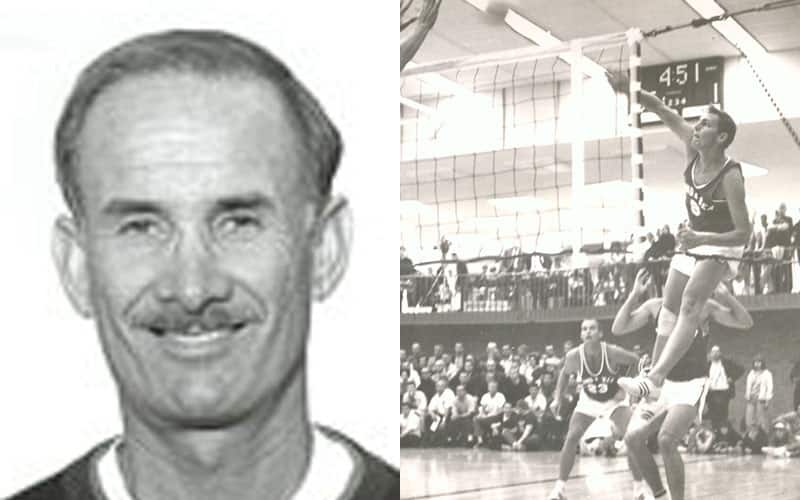
Harlan Cohen (left) and Jack Henn (right), who both competed in volleyball at the 1968 Olympic Games, have recently passed away.
COLORADO SPRINGS, Colo. (March 24, 2020) – USA Volleyball is saddened to learn of the passing of Jack Henn and Harlan Cohen, who were key figures for the U.S. at the 1968 Olympic Games. Henn passed away on Sunday and Cohen passed away on Thursday.
Jack Henn
Henn served as floor captain for the 1968 U.S. Olympic Team as he started every match in Mexico City. He ranked seventh in all-around stats at the 1968 Olympic Games.
“Jack was a great teammate of mine and helped us pull a great upset in our opening match against Russia,” said Rudy Suwara, Henn’s teammate from the 1968 Olympic Games. “We won the fifth set 15-6 and the FIVB called it the greatest upset of the first century of international volleyball.”
Henn joined the prestigious Hollywood YMCA Comets in 1964 where his team finished third in the USVBA Nationals Open Division, second in the Olympic Trials where he was selected an alternate to the U.S. Olympic Team. Between 1966 and 1970, Henn was named Collegiate All-American, Open Division All-American four times, National Open Champion with Sand’ n Sea, Westside JCC, LA “Y’ and Chart House, captained the Pan American Games gold medalists while being named to the Pan American Games All-Star team and represented the U.S. at the 1966 FIVB World Championship in Czechoslovakia.
As testament to Henn’s versatility, he was named All-American in 1966 and 1967 as an outside hitter and was named best setter at the 1968 USA Volleyball Open National Championships. Henn also earned his AAA rating on the beach in the early 1960s when he competed with Bill Ryan in the Southern California beach volleyball circuit.
Henn became a part of USA Volleyball’s Hall of Fame after being selected an All-Time Great Player in 2011.
Harlan Cohen
Cohen, the first full-time head coach for the U.S. Women’s National Team, coached Team USA at the 1968 U.S. Olympic Women’s Volleyball Team. Prior to the 1968 Mexico City Games, he led Team USA to the 1967 Pan American Games gold medal in Winnipeg, Canada, and a silver medal at the 1967 FIVB World Championship in Tokyo. Cohen was an assistant coach for the U.S. Men at the 1966 FIVB World Championships in Czechoslovakia. He later returned as an assistant coach for the U.S. Men during the 1972 Olympic Games qualification tournament.
“We had a lot of success during Harlan’s tenure,” said Linda Murphy, who played under Cohen during the 1967 World Championship. “We were lucky to have a full-time coach who gave his heart and soul to the team. We started to learn from others around the world, and that led to the first steps toward the full creation of our own volleyball culture in the USA.”
After finishing fifth at the 1964 Olympics, Cohen significantly improved the American squad in 1967 with silver at the World Championship. “We came in second at the 1967 World Championships, and we were much improved and finally competitive with Japan,” Murphy said.
Cohen’s coaching career was influenced by Hirofumi Daimatsu, who led the Japanese women to gold at the 1964 Olympic Games. He was big on repetition and was a fundamental technical coach who pursued exactness.
Cohen served as head coach of the Pepperdine University men’s volleyball team in the 1970s, leading the Waves to the 1975 USVBA Collegiate Division National Championship and NCAA runners-up in 1976. He had a 23-9 overall record in his two seasons. Cohen was an assistant coach at Pepperdine under Marv Dunphy in the 1990s, during which Pepperdine won the 1992 NCAA title.
“I will always be grateful for his role he played in my life and what he did for our sport,” said Marv Dunphy, who played for Cohen in 1972 and 1973 at Pepperdine. Dunphy went on to coach the U.S. Men to the 1988 Olympic Games gold medal and has been part of the U.S. Women’s National Team staff at various times in the last decade. “Harlan was an Olympic coach, but he would help any player at any level. He absolutely loved to teach our sport. He was one of the first coaches to train teams at the level to achieve international success, and certainly one of the first to train and believe in the USA Women to do well at that level.”
Cohen, who was a “feisty” setter as a player, “had a lot of friendships as a coach with a lot of players, but he had a special fondness for setters. They had a special place in Harlan’s heart,” Dunphy said.
Cohen has been honored with USA Volleyball’s All-Time Great Volleyball Coach Award in 2000 and its George J. Fisher Leader in Volleyball Award in 1999.
